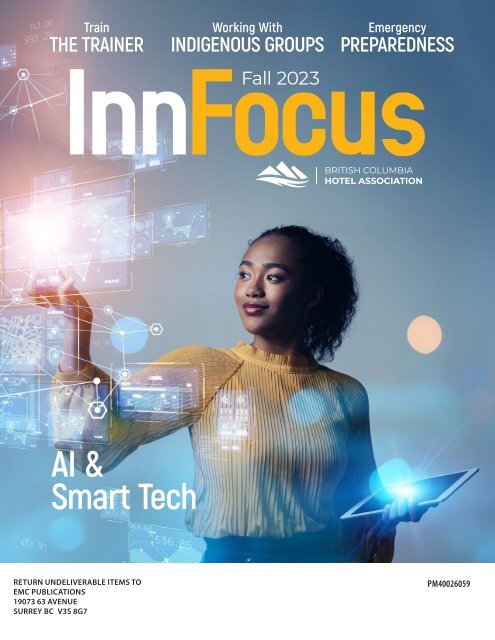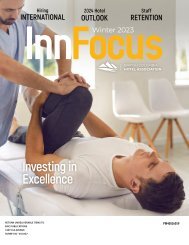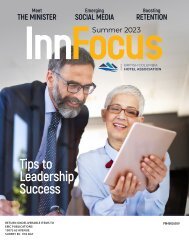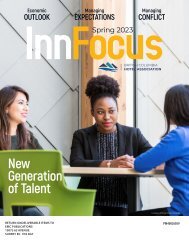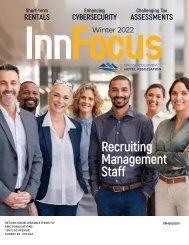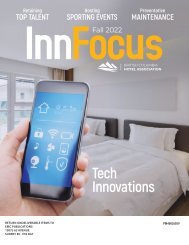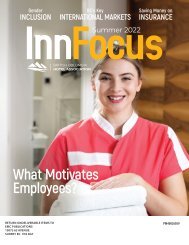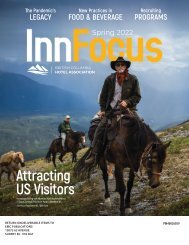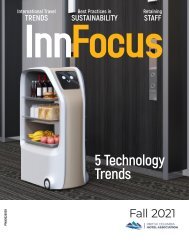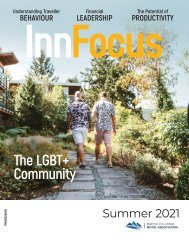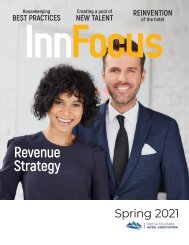InnFocus Fall 2023
InnFocus magazine for hoteliers in British Columbia
InnFocus magazine for hoteliers in British Columbia
Create successful ePaper yourself
Turn your PDF publications into a flip-book with our unique Google optimized e-Paper software.
Train<br />
THE TRAINER<br />
Working With<br />
INDIGENOUS GROUPS<br />
<strong>Fall</strong> <strong>2023</strong><br />
Emergency<br />
PREPAREDNESS<br />
AI &<br />
Smart Tech<br />
RETURN UNDELIVERABLE ITEMS TO<br />
EMC PUBLICATIONS<br />
19073 63 AVENUE<br />
SURREY BC V3S 8G7<br />
PM40026059
contents<br />
200-948 Howe Street,<br />
Vancouver, BC V6Z 1N9<br />
T 604-681-7164 1-800-663-3153<br />
www.bcha.com<br />
@BCHotelAssociation<br />
@bchotelassoc<br />
@BCHotelAssociation<br />
bchotelassociation<br />
BCHA Team<br />
Ingrid Jarrett<br />
President & CEO<br />
Mike Macleod<br />
Director of Operations<br />
Karissa Bourgeault<br />
Project Manager & Board Liaison<br />
Kelsey Millman<br />
Communications Manager<br />
Samantha Glennie<br />
Member Services Manager<br />
Dylan Tomlin<br />
Energy Specialist<br />
Anu Saini<br />
Member Services Coordinator<br />
2022/<strong>2023</strong> Board of Directors<br />
Executive Committee<br />
David McQuinn – Coast Bastion Hotel, Nanaimo (Chair)<br />
Tanya Stroinig – Prestige Hotels & Resorts, Kelowna<br />
(Vice Chair)<br />
Bryan Pilbeam – Delta by Marriott Hotels, Kamloops<br />
(Past Chair & Governance)<br />
David MacKenzie – Pemberton Valley Lodge, Pemberton<br />
(Treasurer)<br />
Angie Eccleston – Crest Hotel, Prince Rupert<br />
(Executive Director)<br />
Jonas Melin – Pinnacle Harbourfront Hotel, Vancouver<br />
(Executive Director)<br />
6<br />
12<br />
20<br />
26<br />
Regulars<br />
AI & Smart Tech<br />
What are the technology trends currently<br />
shaping the hotel industry?<br />
Train the Trainer<br />
Review the core five key steps to training: preparation,<br />
explanation, demonstration, trying, and follow-up.<br />
Working with Indigenous Groups<br />
The tourism and hospitality industry can play an integral<br />
role in lasting, meaningful reconciliation with First Nations.<br />
Emergency Preparedness<br />
A hotel’s core business is to provide people with shelter<br />
when they are away from home, especially in an emergency.<br />
4 BC Hotel Association Report<br />
5 Leader of the Future: Anna McAlary<br />
10 Go Green – Easy-to-implement<br />
Sustainability Tips<br />
18 What’s New?<br />
24 Names in the News<br />
25 Hotelier Feature: Trina White<br />
30 BCHA Member Engagement<br />
Regional<br />
Feature<br />
16 Cranbrook<br />
extras<br />
17 Recruiting from<br />
El Salvador<br />
Directors<br />
Eda Koot, Inn at Laurel Point, Victoria<br />
Erin Cassels, Huntingdon Manor, Victoria<br />
Estreya Gosalbez, Four Seasons Resort, Whistler<br />
Jean-Francois Vary, Fairmont Waterfront Hotel, Vancouver<br />
Jessica Dolan – Ramada Penticton, Penticton<br />
Madone Pelan, Oak Bay Beach Hotel, Victoria<br />
Samantha Hackett – Long Beach Lodge, Tofino<br />
PUBLICATIONS MAIL AGREEMENT<br />
NO. 40026059<br />
RETURN UNDELIVERABLE CANADIAN<br />
ADDRESSES TO CIRCULATION DEPT<br />
EMC PUBLICATIONS<br />
19073 63 AVENUE<br />
SURREY BC V3S 8G7<br />
email: info@emcmarketing.com<br />
<strong>InnFocus</strong> is published quarterly<br />
by EMC Publications - a division<br />
of EMC Executive Marketing Consultants Inc.<br />
19073 63 Avenue, Surrey, BC, V3S 8G7<br />
t 604-574-4577 1-800-667-0955<br />
info@emcmarketing.com<br />
www.emcmarketing.com<br />
Publisher & Editor: Joyce Hayne<br />
Design & Layout: Jerica Glassco<br />
Sales Manager: Beatriz Friz<br />
<strong>InnFocus</strong> 3
y Ingrid Jarrett, President & CEO<br />
A Record-breaking Summer<br />
The summer season is now behind us,<br />
and over this period, we’ve observed<br />
market strength in urban centres, resort<br />
communities, and well-developed regions<br />
for leisure travel.<br />
Our STR reports have indicated recordbreaking<br />
summers in most destinations<br />
unaffected by fires and evacuations.<br />
Looking ahead, several positive indicators<br />
are worth noting. One such indicator is<br />
the increasing international demand for<br />
the BC experience, accompanied by the<br />
hospitality offered by our industry across<br />
the province. However, measuring against<br />
2019 or 2022 with certainty remains a<br />
challenge, given the evident fact that<br />
nothing remains the same; our new reality<br />
operates at a different pace.<br />
A Challenging Wildfire Season<br />
Although certain areas of the province<br />
experienced a successful summer,<br />
others were once again confronted with<br />
the devastating consequences of our<br />
changing environment and the expanding<br />
wildfire season. Notably, Vancouver<br />
Island—particularly Tofino, Ucluelet, and<br />
Port Alberni—witnessed disappearing<br />
reservations overnight due to the Cameron<br />
Lakes Bluff Wildfire, resulting in $44 million<br />
in lost tourism revenue. Similarly, operators<br />
in the Okanagan and Central Interior<br />
were met with the significant financial<br />
repercussions of an essential-only travel<br />
order, as wildfires swept through the region<br />
and tragically consumed West Kelowna’s<br />
Lake Okanagan Resort. Evidently, natural<br />
disasters such as this bear a devastating<br />
impact on our industry, a threat that<br />
continues to escalate in light of climate<br />
change realities. It becomes increasingly<br />
obvious that our province requires reliable<br />
transportation options and corridors for<br />
these vulnerable destinations to safeguard<br />
their businesses.<br />
Our commitment remains steadfast:<br />
ensuring support for accommodators<br />
and hospitality providers of all sizes<br />
throughout the province, with gratitude<br />
extended to those who provided shelter to<br />
displaced individuals during this summer’s<br />
challenging fire season.<br />
Growth in Groups/Meetings<br />
Looking into the remainder of <strong>2023</strong>,<br />
the substantial growth in the groups/<br />
meetings business seen earlier in the year<br />
is expected to continue at a steady pace.<br />
However, there is a degree of hesitancy due<br />
to the reality of interest rates, affordability<br />
concerns, and the looming specter of<br />
recession. Moreover, the escalating costs<br />
of business ownership create a challenging<br />
operating environment.<br />
Focus on Employee Retention<br />
The workforce shortage in some parts<br />
of the province is gradually easing,<br />
prompting most employers to focus on<br />
retention. We are raising wages and<br />
benefits, implementing wellness checks,<br />
and recognizing the significance and<br />
contributions of our hospitality teams.<br />
This is a testament to the fact that we<br />
are fundamentally engaged in the people<br />
business, a principle that will always remain<br />
unchanged.<br />
Advocacy Efforts<br />
Our advocacy efforts are unrelenting.<br />
We’ve commissioned a comprehensive<br />
study on the impact of short-term rentals<br />
on affordability within the province. We<br />
eagerly anticipate sharing these findings<br />
and resources to preserve affordable rental<br />
housing within your community, and to<br />
ensure that municipal policy supports the<br />
livability and affordability of your locality.<br />
Our engagement with multiple ministries<br />
ensures that this research translates into<br />
actionable measures. Additionally, we<br />
persist in our collaborative efforts on the<br />
MRDT ecosystem and FIFA’s large-scale<br />
events with our partners at the Hotel<br />
Association of Vancouver and Destination<br />
Vancouver.<br />
The Tourism Growth Strategy and<br />
supporting the development of hotels and<br />
resort around the province is also a focus<br />
for our work. I am excited about the pipeline<br />
and diverse interest in development<br />
opportunities in all regions of the province.<br />
Upcoming Events<br />
Lastly, we’re thrilled to present several<br />
upcoming events throughout the remainder<br />
of <strong>2023</strong>. These include the SPARK Hotel &<br />
Liquor Conference, scheduled for October<br />
16 & 17 at the Anvil Centre. Furthermore,<br />
we’ve expanded our Fast Track Your<br />
Future education series, featuring five sixweek<br />
courses hosted over Zoom. These<br />
sessions offer targeted training on vital<br />
subjects such as financial leadership and<br />
housekeeping best practices. Moreover,<br />
the BCHA has once again been invited<br />
to participate in the exclusive Destination<br />
Canada Mobility Forum, where we aim to<br />
connect international job seekers from<br />
France and Morocco with employers in<br />
BC to address their hiring requirements.<br />
If you are interested in taking advantage<br />
of this unique and LMIA-exempt hiring<br />
opportunity, you are encouraged to<br />
connect with BCHA’s Workforce Strategist<br />
Alison Langford at alison@bcha.com.<br />
4 <strong>InnFocus</strong>
Leader of<br />
the Future:<br />
Anna McAlary<br />
Spa Treatment Manager, Willow<br />
Stream Spa, Fairmont Pacific Rim<br />
in Vancouver<br />
by Danielle Leroux<br />
Anna McAlary is the Spa Treatment Manager at the Fairmont<br />
Pacific Rim’s Willow Stream Spa and was recently a finalist<br />
for the BC Hotel Association Leader of the Future Award.<br />
McAlary has worked for Fairmont for 13 years in roles that<br />
have brought her around the world from Alberta, to Bermuda,<br />
and now British Columbia. In her current role, she oversees<br />
all the massage therapists, estheticians, and bodyworkers,<br />
helps coordinate treatments being offered, and assists with<br />
other spa operations.<br />
She began her career as an esthetician, later moving into<br />
trainer and supervisory roles and then management while at<br />
the Fairmont Jasper Park Lodge.<br />
“I have always been a fan of makeup and nails,” McAlary<br />
says. “My Grandma sent me for my first manicure and I<br />
naturally had an interest in the industry right off the bat. I<br />
went right into college for esthetics and it came so naturally.”<br />
The wellness industry has evolved into a major market<br />
allowing students to go in multiple directions, but McAlary<br />
didn’t initially imagine herself in the role she is in today. “I<br />
didn’t have a clear goal of moving into management, but I<br />
really had a passion for training and the product lines. I love<br />
creating treatments. Being able to develop staff and see them<br />
become successful is very fulfilling for me.”<br />
A spa director noticed McAlary’s potential and encouraged<br />
her to come back to Canada and start her management<br />
journey. “I have had directors who have been really supportive<br />
and shaped me in different ways,” she explains. “Fairmont has<br />
also provided a lot of incredible development opportunities.<br />
I take several trainings every year, from guest service, to HR,<br />
and more.”<br />
McAlary has looked to these directors for mentorship<br />
when it comes to her own leadership style. “There is always<br />
one thing that stands out from a leader. I take that piece of<br />
knowledge from each of them. It is a big industry but a small<br />
Courtesy of Anna McAlary<br />
world. I am still very interconnected with many colleagues and<br />
we are able to bounce ideas off each other.”<br />
Personally and professionally, McAlary describes herself as<br />
a ‘go-getter’ and wanting to get the job done now. “One of my<br />
former directors would tell me to let it digest,” she says. “In a<br />
fast-paced, guest-facing environment, it feels like you have to<br />
make decisions happen now. But I’ve learned the power of<br />
perspective, sleeping on decisions, and trusting the process.”<br />
This has helped McAlary develop into an intuitive leader<br />
who is connected with her team. “We have little check-ins<br />
to see how people are feeling and the general vibe of the<br />
facility. It is important to build relationships with the team and<br />
maintain professional boundaries but also not be scared to<br />
have open and honest conversations. Communication is the<br />
most important pillar of my own leadership and it is a huge<br />
focus when in such a large operation.”<br />
McAlary’s advice for future leaders is don’t forget about<br />
self-compassion. “You have days when you can be hard on<br />
yourself and want to deliver results, but you also need to be<br />
easy on yourself. You are only human. We all make mistakes<br />
and we all have really great success stories.”<br />
Outside of work, McAlary’s passion for wellness runs strong.<br />
She loves spending time in the outdoors and exploring the<br />
wellness modalities Vancouver has to offer.<br />
As she looks to the future, McAlary wants to move forward<br />
into assistant director and director roles in the spa and is<br />
excited by the opportunity to create wellness or retreat<br />
programs.<br />
<strong>InnFocus</strong> 5
AI &<br />
Smart Tech<br />
for Hotels<br />
How to Find the<br />
Right Solutions in a<br />
Fast-evolving Field<br />
by Joe Pooley<br />
6 <strong>InnFocus</strong><br />
Courtesy of Wyndham Hotels & Resorts
In 1857, a five-story New York City hotel installed the world’s first<br />
passenger elevator. A century later, in 1958, Sheraton introduced<br />
Reservatron, the industry’s first automatic electronic reservation system.<br />
This year, online travel agency Expedia was among the first to integrate<br />
ChatGPT into their system, making booking a trip as easy as typing a<br />
few words.<br />
Travel and hospitality businesses have always been early to the party<br />
with new technology. However, the frenetic pace of change in recent<br />
years has left even the most forward-thinking hoteliers a little unsure of<br />
where to place their bets.<br />
“The tech offerings are growing and sometimes it can be challenging,”<br />
says Luke Ling, General Manager of Hotel Blu in Vancouver, notable as<br />
an early adopter of in-room voice assistants in 2015. “More time goes<br />
to filtering out the solutions and qualifying them so that we can ensure<br />
they’re right for us.”<br />
To help you wade through all the options, here is an overview of the<br />
tech trends currently shaping the hospitality industry.<br />
Keep an Eye on AI (While It Keeps an Eye on You)<br />
AI has elbowed its way to the front of almost every conversation about<br />
tech trends since the launch of ChatGPT in late 2022. Although AI has<br />
quietly been working its way into our daily lives for years, the recent<br />
breakthrough in “generative” AI—the kind that’s capable of having a<br />
conversation with you—has caused a stir because of its potential to<br />
replace uniquely human tasks.<br />
For the average hotel, the uses of generative AI are still in their infancy,<br />
but the possibilities are easy to spot. With Expedia and Booking.<br />
com’s integration of ChatGPT, for example, travellers simply state<br />
their preferences, and an AI assistant does the planning for them,<br />
personalizing itineraries from roughly 1.26 quadrillion variables such as<br />
hotel location, room type, dates, and price. The “virtual agent” is even<br />
there to help work out issues like date changes and cancellations, without<br />
needing to bring another human into the equation.<br />
At the property level, it’s easy to imagine how a guest talking to AI<br />
as he navigates purchases would offer treasure troves of personalized<br />
information that staff could use to further tailor the experience to the<br />
guest’s preferences. Such a world, in which personal AI agents can<br />
simply communicate their clients’ wants and needs to the hotel’s AI<br />
platform—and then, say, adjust in-room climate controls or request extra<br />
amenities—might not be far off.<br />
Naturally, not everyone is a fan of AI encroaching on human territory.<br />
“AI solutions really aren’t on our radar,” says Ling. “Our main focus here<br />
is the boutique experience where we really do want to engage directly<br />
with every guest.”<br />
<strong>InnFocus</strong> 7
AI as an Analyst<br />
AI tools are also evolving in ways that are less likely to stir<br />
controversy. Machine learning, which allows AI platforms to<br />
comb through vast data sets to automate processes and predict<br />
outcomes, makes it an ideal ally for hotel revenue management,<br />
especially dynamic pricing. AI is capable of analyzing countless<br />
variables (competitor rates,<br />
RevPAR indexes, air travel<br />
patterns, weather data,<br />
and social media, among<br />
others), and is therefore able<br />
to optimize prices for hotels,<br />
restaurants, and meeting<br />
venues in real time.<br />
This technology already drives many of the latest dynamic<br />
pricing tools available to hotels. A wider range of inputs, such as a<br />
consumer’s psychology and perceived value of the purchase are<br />
likely to follow as AI-assisted dynamic pricing evolves.<br />
The related frontier of advertising is also seeing AI-driven<br />
evolution. Earlier this year, Google rolled out “Performance Max for<br />
travel goals,” which uses AI to automate the process of creating<br />
and monitoring online ad campaigns. Simply select your hotel and<br />
the platform does virtually everything else, pre-populating ads with<br />
suggested images and copy, serving the ads across its network<br />
(including Google Maps, Search, and YouTube) and automatically<br />
optimizing your spend and audiences over time.<br />
Get Smart(er)<br />
As AI advances, consumer<br />
demand also drives<br />
AI is capable of analyzing<br />
advancements in more tangible<br />
forms of tech, like smart inroom<br />
devices. Franchesca<br />
countless variables.<br />
Adriano of Axxess Industries,<br />
which specializes in smart<br />
guest room controls, has seen an increase in hoteliers responding<br />
to a desire for a “more intuitive experience for their guests.” Their<br />
electronic do-not-disturb controls, for instance, are a welcome<br />
change from the traditional paper signs, especially for ecoconscious<br />
guests. These controls also allow housekeeping staff<br />
to work more efficiently, as occupancy sensors indicate when<br />
rooms are free to clean.<br />
Expect to see more advancement in the area of smart room<br />
8 <strong>InnFocus</strong>
Courtesy of Axxess Industries<br />
controls in the near future. “There’s a lot<br />
of room to improve automation and control<br />
and make it even more seamless, more<br />
user-friendly,” says Adriano.<br />
The Tipping Point<br />
Leveraging the technology guests carry in<br />
their pockets, hotel giant Wyndham made<br />
Embrace Experience<br />
As the tech revolution marches on, it’s worth<br />
reflecting on the fact that remarkably little<br />
has changed about the reasons why we<br />
travel in the first place: to have the kinds<br />
of experiences technology cannot as of<br />
yet replace, like the smell of a fresh-baked<br />
baguette from a boulangerie, the sumptuous<br />
The biggest success story is the size of<br />
the average tip, which is just under $10.<br />
waves last year by rolling out a mobile<br />
tipping platform for their US and Canadian<br />
franchisees.<br />
The platform allows guests to scan a QR<br />
code, select a staff member and choose<br />
how much to tip. QR codes are unique<br />
to each staff member and the tips can be<br />
deposited directly to their bank account.<br />
“The biggest success story is the size of<br />
the average tip, which is just under $10,”<br />
says Wyndham CIO Scott Strickland. “That’s<br />
a substantial increase over what would<br />
historically be a tip of $3 to $4 and becomes<br />
all the more important amid the labour<br />
shortages currently impacting our industry.“<br />
fabrics lining a faraway bazaar, or a friendly<br />
handshake from a person whose story<br />
you’ve yet to hear.<br />
Integrating AI and other cutting-edge<br />
solutions into hospitality provides exciting<br />
opportunities, to be sure. But the best tech<br />
is that which helps you deliver memorable<br />
experiences to your guests; it is important<br />
that any advancements in our industry serve<br />
this mission above all others.<br />
Joe Pooley is Account Director at Redshift<br />
Collective, where he helps hotels build their<br />
brand, connect with audiences, and drive<br />
more bookings.<br />
<strong>InnFocus</strong> 9
GO<br />
Green<br />
10 Easy-to-implement<br />
Sustainability Tips<br />
by Trina White<br />
Shifting any hotel or resort to a sustainably focused property may<br />
seem very daunting at first, but if broken down into smaller steps,<br />
it won’t only be achievable but fiscally beneficial. Here’s a 10-step<br />
quick guide to get you started:<br />
1) Hand-dryers<br />
To make a quick impact on reducing the use of trees and costs,<br />
replace paper hand towels in public washrooms with energyefficient,<br />
non-warming air hand dryers equipped with HEPA filters.<br />
The new hand dryers on the market use very little energy, reduce<br />
waste in landfills, and are easier to tidy up after (no scattered<br />
paper towels).<br />
2) Paper<br />
Hotels use a lot of paper from receipts, statements, sales<br />
contracts, and marketing materials to administrative documents.<br />
Review existing paper processes to identify areas suitable for<br />
automation and elimination. For any paper that is essential, shift<br />
to 100% post-consumer products. Do not forget till paper—many<br />
companies now offer 100% recycled till paper.<br />
3) Recycling Streams<br />
Ensure there are thorough recycling options in the staff room,<br />
change rooms, back offices, commercial kitchens, and garbage<br />
room. These spaces should include an opportunity to dispose of<br />
paper, plastics, tin, glass, paper, cardboard, Styrofoam, bottles,<br />
and compost. A good way to set these up is to make the bins<br />
easy and accessible with clear images of what goes in each. The final<br />
step is to make the garbage can small and move it further away. This<br />
way team members have to walk by all other options before reaching<br />
the garbage can.<br />
4) Maintenance Shop<br />
Regular maintenance on hotels is a big job and so are the daily items<br />
that are used, which can end up in the landfill. Near the maintenance<br />
shop, create multiple bins for recycling batteries, light bulbs, paint,<br />
wood, metal, electronics, and other more focused streams for this<br />
department.<br />
5) Team members<br />
Typically, hotels have more recycling options than what team members<br />
have access to in their community roadside pick-ups and further<br />
recycling is required. Encourage hotel team members to use the hotel’s<br />
recycling streams for their own personal recycling.<br />
6) Bottle Depot<br />
Get creative with how bottle return refunds are used. Think of donating<br />
funds to the housekeeping department, team member social events,<br />
or local charities which the depot usually manages on your behalf.<br />
7) Dispensers:<br />
Mini-bottles and single-use plastics are a thing of the past. Before<br />
signing the next contract with amenity suppliers, check out the market<br />
for products that can go into dispensers. Most companies that sell mini,<br />
10 <strong>InnFocus</strong>
single-use bottles now have dispenser<br />
options. This way the hotel can stay with<br />
products your guests enjoy.<br />
8) Soap for Hope:<br />
Even if dispensers are used, make sure<br />
a partnership with Soap for Hope or a<br />
like-minded organization is made. Soap<br />
for Hope will remove monthly leftover<br />
hygiene products, old linens, and lost<br />
and found items. It re-purposes these<br />
items for transitional homes, food banks,<br />
senior centres, schools, refugee centres,<br />
and dozens of other facilities.<br />
9) Faucet Aerators:<br />
These are important in saving water and<br />
making the water flow more productive.<br />
Bathroom sinks for face washing and<br />
brushing teeth can be as low as five litres<br />
per minute, whereas in the kitchen you may<br />
want six or seven litres per minute. Attempt<br />
to use aerators with the highest restriction<br />
to minimally affect guests’ experience.<br />
Make sure to also clean these at least<br />
once per year in the deep clean schedule.<br />
10) Pool & Hot Tub Covers:<br />
Even with an indoor pool or hot tub,<br />
covers can help save on energy and<br />
water evaporation as well as help with<br />
indoor air quality. Pools and hot tubs<br />
use less energy when the temperature<br />
is consistent and water levels can be<br />
maintained. Placing a cover on overnight<br />
will help keep the water regulated, saving<br />
on energy. Covering pools can also<br />
help reduce off-gassing of chloramines,<br />
helping to keep the air quality cleaner.<br />
By implementing even just a few of<br />
the above steps, any property will be<br />
well on its way to becoming sustainable.<br />
Leading by example will allow everyone<br />
to see the overall goal that can be<br />
attained together as a team.<br />
Trina White has over 20 years of<br />
experience as a General Manager,<br />
most recently with The Parkside Hotel<br />
& Spa, and is Associate Professor at<br />
Royal Roads University with a focus in<br />
Sustainable Tourism. In <strong>2023</strong>, she was<br />
named Hotelier of the Year by The BC<br />
Hotel Association.<br />
<strong>InnFocus</strong> 11
Train the<br />
Trainer<br />
by Angela Sosnoski<br />
12 <strong>InnFocus</strong>
Regardless of the size of a hotel, managers cannot be expected<br />
to do it all. The ever-growing list of expectations from guests,<br />
new technology, and increasing regulations demand that<br />
managers must share the burden of training with supervisors and<br />
employees. Many managers could also hone their training skills<br />
to increase the pace of implementation, overcome resistance to<br />
new programs, and enhance workplace morale. Effective new<br />
trainers can be developed with a simple framework.<br />
A wise human resources person once remarked about the<br />
core training steps being: “I will tell you, you will repeat back<br />
to me, then I will show you, and then you will show me.” More<br />
formally, we recommend five key steps: preparation, explanation,<br />
demonstration, trying, and follow-up.<br />
Preparation<br />
This is what you may recall from school to be the curriculum.<br />
Critically, it is about defining what outcomes you want to achieve<br />
at the end of the training and then putting in place the materials<br />
and activities to achieve those outcomes. Often this involves<br />
refreshing your own knowledge about the topic, making sure<br />
that any training materials supplied by a vendor or regulator<br />
are appropriate for your audience (and adjusting as needed),<br />
making sure that you have the training tools available (training<br />
on a new computer system, for example, will almost certainly<br />
require access to a computer), and things as simple as having<br />
sign-in sheets for the training.<br />
Preparation also includes a focus on the learners before and at<br />
the start of the session. Learning or knowing about the training<br />
participants previous experience with the topic, understanding<br />
how they like to learn, and alleviating concerns at the start of<br />
the session will increase the likelihood of achieving the learning<br />
outcomes for everyone. Trainers should be prepared to pivot—<br />
through good preparation—to different types of activities or<br />
materials to match the needs of the learners. Even simple steps<br />
like isolating the best five minutes of a 20-minute video prior<br />
to the training can make a big difference in the success of the<br />
session. Preparation for a trainer can be summarized in a short<br />
sentence: Plan your ideal lesson and plan to adapt that lesson<br />
when the inevitable need for change arises.<br />
Explanation<br />
You should tailor the what, why, how, and when to the learners.<br />
The question “Why?” is often understated and not focused on<br />
something beneficial for the learner. While a new front office<br />
system may make things much easier for the accountant, if you<br />
are training front desk staff, you should think about a compelling<br />
Insurance for<br />
Hotels<br />
Motels<br />
Bars<br />
& Pubs<br />
Get A Quote<br />
<strong>InnFocus</strong> 13
“why” that positively impacts them such as “other hotels that<br />
implemented this system reported that they could check people in<br />
two minutes quicker, and the guest feedback about the check-in<br />
experience increased by 15% after implementation.” Connection<br />
to the “Why?” increases training success.<br />
Explaining skills and tasks to learners is most effective using<br />
easy-to-follow steps, which are clear, concise, and free of jargon.<br />
If the steps are difficult, add more steps to the learning process.<br />
Consider having check sheets or other training tools to supplement<br />
your explanations.<br />
Demonstrate<br />
Demonstrating brings<br />
a visual element to<br />
your training. This is<br />
not the time for the<br />
trainer to show off<br />
how good they are at<br />
something; shortcuts and “pro tips” come later in the learning<br />
process. Trainers should model the best way to perform the<br />
task—safely with a focus on details and accuracy. As a trainer<br />
plotting out how you will demonstrate a new skill or task, you<br />
should question what is going to help the learner best understand<br />
and visualize the task. Think about product sales at a home show<br />
or on late night TV: people are more likely to purchase slicers,<br />
knives, and cleaning products after witnessing the demonstration.<br />
How will your “demo” entice the learner to follow all the steps to<br />
success?<br />
Try Out<br />
Practice and repetition are simple but effective tools if used in<br />
a planful way. Be prepared to safely stop the practice to allow<br />
the learners to discover and correct their own errors. Be careful<br />
to not let learners practice bad techniques. When people are<br />
“getting it”, ask open<br />
ended questions like<br />
Plan your ideal lesson and plan to adapt<br />
that lesson when the inevitable need<br />
for change arises.<br />
“How did you know you<br />
were doing it right?”<br />
or have the learner<br />
train you on the task to<br />
demonstrate that they<br />
truly understand what<br />
they’re doing. Another<br />
effective technique is to have the learner verbally repeat the steps<br />
as they perform them.<br />
Trying out new tasks is most effective when the pressure is off.<br />
For example, practicing checking in a guest for the first time, on<br />
a new system, is much easier in the back office than it is with real<br />
guests lining up in the lobby. Investing in a bit of extra training time<br />
so that your staff have a safe place to learn will pay future dividends.<br />
14 <strong>InnFocus</strong>
Follow-up<br />
Training is not a one-time event; it is best thought of as a<br />
process or as a journey. What are the one-day, one-week,<br />
and one-month goals? What are the accomplishments along<br />
the way that should be recognized? Are the goals and the<br />
accomplishments to be recognized tied to the bigger picture,<br />
which is why you’re doing this?<br />
Learners should be aware of different options to go for<br />
help if it is needed. Can visual aids be placed where the<br />
task is performed or is there a website or instruction manual<br />
nearby? Finally, during the follow-up phase, continue to<br />
provide specific feedback at both the individual level (you<br />
need to pause after asking the guest how they are going<br />
to pay) and group level (our average check-in time dropped<br />
two minutes last month).<br />
Continuously strive for improvement each time you<br />
conduct training. Have you got feedback loops built into<br />
your training from learners and are you achieving the<br />
outcomes you set out to attain at the start of the training<br />
process? Continual improvement in training can make<br />
your hotel more successful with better engagement,<br />
reduced turnover, and improved productivity.<br />
Angela Sosnoski is a consultant at HR West focused on<br />
workplace investigations and anti-bullying and harassment<br />
training. She can be reached at angela@hrwest.ca.<br />
<strong>InnFocus</strong> 15
Discover the<br />
Hidden Gem<br />
of the Kootenays:<br />
Cranbrook,<br />
BC<br />
by Diane Selkirk<br />
Encircled by forests and mountains,<br />
Cranbrook has long served as a gateway<br />
to the beautiful Kootenay Rockies, an area<br />
renowned for its breathtaking landscapes<br />
and recreation opportunities. Located<br />
820 km east of Vancouver, and 850 km<br />
west of Calgary, the city of over 20,000 is<br />
also the largest in the region, and functions<br />
as the area’s administrative center. But being<br />
the supply town for the Kootenays has both<br />
positives and negatives, says Kristy Jahn-Smith,<br />
the executive director of Cranbrook Tourism.<br />
“Residents of the surrounding resort towns come<br />
for appointments or meetings, but usually don’t plan<br />
to stay,” she says.<br />
Enticing regional and international guests to see<br />
Cranbrook as more than just a highway pit stop or<br />
service centre has become a passion for Jahn-Smith.<br />
The downtown has been undergoing a multi-phase<br />
revitalization—something that benefits locals and visitors<br />
alike. “Our hope is that people will consider adding a night<br />
or two and start exploring,” she says. With a rich history,<br />
panoramic vistas, and a thriving cultural scene, Jahn-Smith<br />
says Cranbrook shines brightest once people get off the<br />
highway.<br />
Crystal Scott, the General Manager at the Prestige<br />
Rocky Mountain Resort agrees. The full-service hotel has a<br />
swimming pool, spa, and restaurants and is easily walkable to the<br />
downtown core with its museums, galleries, and sports facilities.<br />
Scott says visitors are often charmed by how friendly the town<br />
Courtesy of Elizabeth Lake Lodge<br />
16 <strong>InnFocus</strong>
feels. “It’s a wonderful surprise for guests to discover that not<br />
only do we have lots to offer, we’ve retained our small-town<br />
warmth.”<br />
With the world-class Canadian Museum of Rail Travel;<br />
where beautifully restored railway cars tell the story of<br />
Canada’s rail heritage and Fort Steele Heritage Town; a<br />
restored 19th-century mining and railway town—visitors<br />
are often surprised by how deeply they can immerse in the<br />
region’s intriguing past. Scott notes history and rail buffs are<br />
also often thrilled to discover one of Prestige’s more unique<br />
offerings. “We brought in a real railcar and transformed it into<br />
two suites for guests to stay overnight in,” she notes.<br />
Leaning into what makes Cranbrook special has also been<br />
a focus for Ian Phyper, general manager of the century-old<br />
Baker Hotel. Phyper hopes the hotel, which is undergoing<br />
an extensive room-by-room renovation, can serve as a<br />
hub for collaborative efforts. “We’re creating packages and<br />
partnerships that benefit locals and travellers,” he says. “The<br />
goal is to support the tourism industry that’s already here.”<br />
Phyper, who moved to Cranbrook because of its livability<br />
and its wide range of local businesses, says it’s a city that’s<br />
easily overlooked: “We have all these options; rafting, biking,<br />
horseback riding, live theatre, and concerts, fly-fishing, and<br />
golfing, and by forming partnerships between all of us we<br />
can encourage people to stay longer.” For the Baker Hotel,<br />
which turns 100 on October 31—getting people to stay longer<br />
is also part of its design goal; each room is decorated with<br />
distinctive antiques that were found throughout the region.<br />
“We want people to come back and stay in a different room<br />
every visit,” Phyper explains.<br />
George Freitag, owner of Elizabeth Lake Lodge, an alpine<br />
hotel bordering the Elizabeth Lake Conservation area, says<br />
because the beauty and opportunities in Cranbrook are<br />
often unexpected, the town now stands out by focusing on<br />
what visitors might discover they want after they arrive. With<br />
beginner-friendly mountain bike trails “that allow you to bike<br />
through the treed trails with relatively few bumps” and some<br />
of the best disc golf courses around, he says his hotel opted<br />
to provide complimentary high-quality bikes as well as discs<br />
for golfing the five local courses. And like the Baker Street<br />
Hotel, partnerships add to the offerings. “We connect visitors<br />
with local businesses so they can do things like explore the<br />
lakes,” he describes.<br />
“The strength of tourism in Cranbrook is its ability to bring<br />
together a diverse range of outdoor activities, natural beauty,<br />
rich history, and new restaurants and festivals,” says Michael<br />
Sprake director of sales and marketing at the luxurious,<br />
Indigenous-owned St. Eugene Golf Resort and Casino. The<br />
resort adds to this strength by including the rich history of<br />
the Ktunaxa First Nation, Indigenous culture, and the history<br />
of the resort itself.<br />
Sprake says that while visitors may not always know to<br />
expect all the opportunities and experiences that greet<br />
them in Cranbrook, once they take the time to immerse<br />
themselves in the region their expectations are exceeded.<br />
After a visit, Cranbrook will feel like a “compelling and wellrounded<br />
destination,” that’s shifted from an unknown to “an<br />
unforgettable Kootenay Rockies experience.”<br />
Courtesy of Prestige Hotels & Resorts<br />
Courtesy of St. Eugene Golf Resort and Casino<br />
Courtesy of The Baker Hotel<br />
<strong>InnFocus</strong> 17
y Deb Froehlick<br />
ASSA ABLOY Global Solutions is introducing Traka21, a plug-and-play key<br />
management system that provides a streamlined solution for managing keys and ensuring<br />
they are available to authorized personnel by securing and managing each key or key<br />
set, helping hoteliers maintain accountability, preventing disruptions to critical operations.<br />
ASSA ABLOY Global Solutions: +1 800 225 8464<br />
Western Financial Group continues to lead in the hospitality insurance marketplace<br />
by protecting restaurants, hotels, motels, and liquor stores in a unique way. By pooling<br />
you with hundreds of your peers, their new Protect Self-Insurance Structure offers an<br />
insurance program that has the ability to return premiums to you each year. https://<br />
hipinsurance.ca/<br />
NEXT ISSUE:<br />
Reserve Space in the<br />
Winter Issue of <strong>InnFocus</strong><br />
Business Outlook<br />
Forecasting into the Future<br />
10 Steps to Hiring International Workers<br />
Creating an Equitable Workspace<br />
BetterTable.ca is launching a card game for hospitality leaders. Challenge your teams<br />
with insightful questions to improve the triple bottom line, from Culinary, Events, Finance,<br />
F&B, Front-of-House, and Human Resources to Sales & Marketing. It also includes<br />
diversity bonus cards. The more you play, the more profitable your operations will be.<br />
Pre-book yours at https://BetterTable.ca/games<br />
Telus Business is launching its new Optik TV® for Business platform. With built-in casting<br />
and Google Play integration, guests can effortlessly stream their favourite content from<br />
popular apps directly to the in-room TV. The new TV solution is Android-based, offering<br />
a familiar and intuitive interface for easy navigation. hospitality@telus.com<br />
Reserve space by October 20th<br />
604-574-4577 • info@emcmarketing.com<br />
18 <strong>InnFocus</strong>
Recruiting from<br />
El Salvador<br />
by Joyce Hayne<br />
The BC Hotel Association (BCHA) is working to create<br />
partnerships with countries to create a pathway for skilled,<br />
experienced workers to come work in the hospitality industry<br />
in British Columbia. One of those countries is El Salvador, so<br />
we reached out to Cesar Augusto Orellana Murillos, Consulate<br />
General at the El Salvador Consulate to see how the program<br />
is working from his perspective.<br />
How did the partnership between the BCHA and the<br />
Consulate of El Salvador come to be?<br />
Officers of the embassy of El Salvador in Canada, which is<br />
located in Ottawa, had the first approach with the BCHA in<br />
January 2022. Alison Langford, Workforce Strategist from the<br />
association, and Fernando Aguilar from the Embassy of El<br />
Salvador started the conversations.<br />
Why did you choose British Columbia as a partner?<br />
As the Province of British Columbia is part of the jurisdiction<br />
attended by the Consulate General of El Salvador in Vancouver, I<br />
as Consul General took the responsibility to make an agreement<br />
with one of the most important associations in the province, in<br />
an area that is very dynamic, such as hotel and tourism.<br />
What impact does this partnership have on the wellbeing<br />
of El Salvadorians?<br />
It has a positive impact. The life quality of the workers and their<br />
families in El Salvador are benefited through the improvement<br />
of their income and the sending of remittances of money. Also,<br />
it improved the skills of our workers working in the environment<br />
of a developed country.<br />
What are your goals for this partnership?<br />
Our goal is to increase the recruitment of our workforce in more<br />
hotels and restaurants. Also, I would like to get training from<br />
BCHA to our potential candidates in El Salvador to improve their<br />
skills and increase their knowledge. It would be easier to get an<br />
interview and to be accepted in their associated companies.<br />
How can hoteliers participate in the program?<br />
Hoteliers can participate by having confidence in our country,<br />
opening the doors of their hotels to get interviews for our<br />
candidates, and sharing their knowledge and abilities with<br />
our people.<br />
Interested employers are encouraged to reach out to Alison<br />
Langford, BCHA’s Workforce Strategist, for more information.<br />
<strong>InnFocus</strong> 19
Working with<br />
Indigenous<br />
Groups<br />
How Hotels and Indigenous<br />
Groups Can Work Together<br />
by Danielle Leroux<br />
Courtesy of St. Eugene Golf Resort and Casino<br />
20 <strong>InnFocus</strong>
Courtesy of Destination Vancouver/Kindred & Scout<br />
British Columbia is home to 204 Indigenous communities and<br />
more than 30 Indigenous languages. By bringing people together<br />
and sharing the true stories of BC, the tourism and hospitality<br />
industry can play an integral role in lasting, meaningful reconciliation<br />
while building stronger connections with Indigenous Peoples,<br />
communities, and culture.<br />
“It is about being respectful of the land we’re on and the history of<br />
Canada. It is also about providing an inclusive experience and being<br />
inclusive in our communities,” says Brian Pilbeam, Chief Operating<br />
Officer of Invictus Properties Inc. whose portfolio includes the Delta<br />
Hotels Kamloops.<br />
Indigenous tourism and cultural experiences are also something<br />
visitors want. Prior to the pandemic, Indigenous tourism was the<br />
fastest-growing sector of the tourism industry and generated $705<br />
million in gross domestic output and created 7,400 full-time jobs.<br />
According to Destination BC, one in four visitors to BC actively seek<br />
authentic Indigenous experiences.<br />
How to Get Started<br />
Get up to speed. Educate yourself on reconciliation and understand<br />
what your work with Indigenous groups may look like. Begin by<br />
familiarizing yourself with important documents that include the<br />
United Nations Declaration on the Rights of Indigenous Peoples<br />
(UNDRIP), National Centre for Truth and Reconciliation Calls to<br />
Action, and BC Declaration on the Rights of Indigenous Peoples Act.<br />
You can also refer to resources from Indigenous Tourism BC<br />
(ITBC) and Destination BC. ITBC is dedicated to raising awareness<br />
of the diverse and enriching Indigenous tourism experiences<br />
available in BC. The non-profit organization communicates directly<br />
with consumers, travel trade, and travel media creating interest in<br />
Indigenous tourism experiences, activities, and products.<br />
Destination BC partners with ITBC and upholds the UNDRIP,<br />
the Truth and Reconciliation Commission, and the Declaration Act<br />
Action Plan.<br />
<strong>InnFocus</strong> 21
Get Outside Help and Build Relationships<br />
Building and maintaining respectful relationships is at the core of<br />
working with Indigenous groups. “We build relationships before<br />
we build partnerships. Getting to know one another on a personal<br />
level not just professional is huge,” says Frank Antoine, Chief of<br />
Bonaparte First Nations and Co-Founder and CEO of Moccasin<br />
Trails. Present it as a business proposition to First Nations groups.<br />
“This is who we are, we’re in your territory, and we want to work<br />
with you more closely,” adds Antoine.<br />
“You can’t do it on your own,” Pilbeam says. “Reach out to<br />
your local First Nations community and find good partners. Be<br />
open and authentic in<br />
what you’re hoping to<br />
achieve. Think about<br />
the little pieces you can<br />
implement. Don’t sit<br />
there and try to create<br />
a massive ‘Indigenize’<br />
plan. Invite your partners to lunch and have a conversation. Build<br />
authentic partnerships and respect. It becomes much easier to<br />
ask those uncomfortable questions and have dialogue.”<br />
Moccasin Trails<br />
Pilbeam and Antoine first crossed paths over seven years ago<br />
when Antoine was employed at Quaaout Lodge & Spa at Talking<br />
Rock Golf Resort.<br />
Today, Antoine and his co-founder Greg Hopf run Moccasin<br />
Trails, an Indigenous-owned and operated company that guides<br />
guests on sustainable journeys that the Interior Indigenous<br />
Nations have made for generations.<br />
Their canoe, walking journeys, and other cultural experiences<br />
are led by knowledge keepers that share and strengthen their<br />
connection to Indigenous land and culture through songs, stories,<br />
ceremonies, and language.<br />
Build authentic partnerships<br />
and respect.<br />
Beginning this fall, Moccasin Trails will be doing more work<br />
with hotels, helping to ‘Indigenize’ them and better understand<br />
the history, culture, and First Nations people around them. “We<br />
want to help welcome the local people involved in that area. It is<br />
not just another corporation coming in,” Antoine says. “There is<br />
a lack of community spirit and we want to revitalize that.”<br />
Practical Next Steps<br />
Here are some practical next steps hoteliers can take to recognize<br />
and work with Indigenous groups:<br />
1. Language is Important.<br />
It is important to show whose<br />
land you are on by saying it,<br />
writing it, and displaying it.<br />
“Learn the words before you<br />
write them. Oral history is<br />
how we learn our languages,”<br />
Antoine explains.<br />
2. Incorporate Something that is Part of the Land.<br />
From artwork and food to beverages and soap, numerous<br />
opportunities exist to incorporate products connected to the<br />
land. For instance, at the Delta Hotels Kamloops, every room<br />
has dreamcatchers behind the bed, which are made by a local<br />
Indigenous artist. “People love it and talk and ask about it,” says<br />
Pilbeam.<br />
Consider incorporating ethically sourced sage in a cocktail<br />
or hosting a dinner with an Indigenous chef featuring local<br />
Indigenous products. “It is in all the things—the artwork, food<br />
and beverage, the way we communicate and share. We are only<br />
a small step of the way there. It is something that takes time,”<br />
Pilbeam explains.<br />
22 <strong>InnFocus</strong>
Courtesy of Destination BC/Hubert Kang<br />
3. Educate Staff and Guests.<br />
Engage a company like Moccasin Trails to educate staff at all various<br />
levels. “Everyone has a different role to play but it starts from the<br />
top. The manager needs to be invested; it can’t be done from the<br />
ground up,” says Antoine. “We don’t want our culture systemized.<br />
We don’t have a top to bottom. We work in a circle, everyone is<br />
equal. I am not the only one making a decision. Staff are involved<br />
in the process, too.”<br />
When guests check in, incorporate First Nations language, and<br />
explain why. Instead of a Bible in the bedside table, provide the<br />
history of the local Indigenous community, Antoine suggests. “Let<br />
guests experience culture through the five senses,” he adds.<br />
He also encourages hoteliers to hire staff from a First Nations<br />
perspective and prepare someone for a manager role who is<br />
Indigenous.<br />
4. Be Aware of What’s Happening in Local Indigenous<br />
Communities.<br />
Consider offering special room rates during local Pow Wows and<br />
maintaining ongoing support for Indigenous events. “We want to<br />
see fairness in advertising and support of Indigenous events,” says<br />
Antoine.<br />
5. Be Open to the Process.<br />
“We do a lot of business back and forth with the different First<br />
Nations groups in the area,” notes Pilbeam. “They feel welcomed<br />
and respected. It is not something you can become ‘certified in.’ It<br />
is an ongoing journey and process.”<br />
Be authentic, keep learning, and have an open mind as you begin<br />
or continue to build relationships with local Indigenous groups.<br />
<strong>InnFocus</strong> 23
NAMES IN THE NEWS<br />
by Deb Froehlick<br />
New Members<br />
The BC Hotel Association is proud to<br />
welcome these new members:<br />
Allied Members:<br />
Foreseeson EVSE Technology Inc.<br />
Hytera Communications Canada<br />
JRoss Hospitality Recruiters Inc.<br />
Snowstorm Technologies (UK) Ltd.<br />
Veritree Technology Inc<br />
Wyrk.io<br />
Accommodation Members:<br />
Microtel Inn & Suites by<br />
Wyndham Fort St John<br />
Pinnacle Hotel at the Pier<br />
Community Members:<br />
Career City College<br />
Destination Vancouver<br />
Indigenous Tourism BC (ITBC)<br />
Northern BC Tourism Association<br />
Pacific Link College<br />
Appointments<br />
The Hotel Association of Canada has<br />
appointed Cara Shulman as its new Vice<br />
President, Programs and Partnerships.<br />
Shulman was previously Mortgage<br />
Professionals Canada’s Vice President,<br />
Membership & Events. Prior to that she<br />
worked at Cottage Life Shows, Habitat<br />
for Humanity Toronto, and Greater Toronto<br />
Home Builders’ Association.<br />
Invictus Properties and Delta Hotels<br />
by Marriott Kamloops are pleased to<br />
announce the<br />
appointment of<br />
Jocelyn Bennett<br />
as General<br />
Manager. Jocelyn<br />
has a strong<br />
track record of<br />
success and vast<br />
experience in<br />
Cara Shulman<br />
the industry and<br />
brings a wealth<br />
of strategic<br />
expertise. When<br />
asked about her<br />
vision for the<br />
hotel, Jocelyn<br />
stated “I am<br />
inspired by the<br />
team and focused<br />
Jocelyn Bennett<br />
on growing new<br />
a n d c u r r e n t<br />
leaders while continuing to strengthen<br />
the culture at Delta Kamloops.”<br />
Lynette Peters has been appointed as<br />
the General Manager of Prestige Beach<br />
House in Kelowna, a testament to her<br />
expertise and dedication to hospitality.<br />
As a flagship property of Prestige Hotels<br />
& Resorts, her leadership will undoubtedly<br />
uphold and elevate the establishment’s<br />
legacy of excellence.<br />
Congratulations<br />
Comfort Inn & Suites in Terrace was<br />
named Hotel of the Year by Choice Hotels<br />
Canada. To qualify, the winning hotel must<br />
have received a <strong>2023</strong> Platinum Guest<br />
Satisfaction Award, which recognizes<br />
properties in the top 3% of Choice Hotels<br />
Canada’s portfolio.<br />
The BCHA proudly celebrates Joanna<br />
Jagger, MA, CPHR, at WORTH Association<br />
for her recognition as one of the 100 Most<br />
Inspirational Leaders in Global Hospitality<br />
and Travel. Featured in the esteemed<br />
Global Hospitality Magazine, Joanna joins<br />
other outstanding award winners in this<br />
prestigious accolade.<br />
Destination Canada has earned global<br />
recognition for sustainability of business<br />
events with the <strong>2023</strong> IMEX-EIC Innovation<br />
in Sustainability Award. It recognizes<br />
Destination Canada’s longstanding<br />
commitment to reducing its environmental<br />
impact. The award pays homage to its<br />
Canadian Business Event Sustainability<br />
Plan, a first-of-its-kind program aimed at<br />
improving the economic, socio-cultural,<br />
and environmental sustainability practices<br />
of business events hosted in Canada.<br />
24 <strong>InnFocus</strong>
HOTELIER FEATURE:<br />
Trina White<br />
General Manager at The Parkside<br />
Hotel & Spa in Victoria<br />
by Danielle Leroux<br />
Trina White is an active leader in Vancouver Island and BC’s<br />
tourism and hospitality industry: General Manager of The Parkside<br />
Hotel & Spa in Victoria, Associate Professor at Royal Roads<br />
University, and a director on multiple tourism boards. She was<br />
recently awarded the BC Hotel Association Hotelier of the Year.<br />
White got her start in the hospitality industry at the age of 15<br />
working at an A&W on Vancouver Island. “I became Assistant<br />
Manager and would work with customers, do training and<br />
inventory, help do the dishes and cooking, and do some hiring.<br />
I loved the diversity,” she says. “I didn’t realize at the time how<br />
much I enjoyed it.”<br />
Passionate about sustainability, White decided to go into a<br />
Bachelor of Science program with plans to pursue a career in<br />
silviculture. But by third year, she realized, “I was holding my<br />
ground but I wasn’t excelling in the sciences. Things weren’t quite<br />
jiving for me. I decided to look at what I had been doing all along<br />
at work. The business side came very naturally to me.”<br />
White decided to complete a Business Diploma at Camosun<br />
College. During her time there, she completed a tourism elective<br />
and was exposed to a book that would have a lasting impact on<br />
her—The Eye of the Elephant by Mark and Delia Owens. She had<br />
stumbled across the concept of ecotourism. “This book had me<br />
think about tourism in a new way and I could see how tourism<br />
could start to align with my values,” White says.<br />
She got her start in tourism as an adventure tour guide operator.<br />
The job took her to incredible places but it wasn’t ultimately for<br />
her. “I realized that when I got stuck for an extra week and a half<br />
with a group I didn’t like,” she says with a laugh. “After the last<br />
person from the group departed on the plane, I gave my notice,<br />
packed up my belongings, and moved to Calgary.”<br />
With persistence, White landed a job as a sales administrator<br />
for Delta Hotels. In 2002, she moved to Cranbrook to be on the<br />
Courtesy of Trina White<br />
opening team of the Delta Hotel (now the St. Eugene Resort Hotel)<br />
as conference services manager. “Once I got to Cranbrook, I<br />
knew I wanted to eventually be in the GM position,” she says. “I<br />
built my career by working hard, putting in long hours and long<br />
days, and leaving a positive impression.”<br />
In 2003, White moved back to Victoria to work for the Sandman<br />
Hotel Group and was put into the General Manager training<br />
program. “An opportunity became available to be Operations<br />
Manager at Brentwood Bay Resort when I was 27 years old,”<br />
she says. She took the job despite experiencing challenges as<br />
a young female navigating pregnancies and being a mother in a<br />
male-dominated industry.<br />
In 2009, White took on her current role as GM of The Parkside.<br />
She has been there since it opened. “I have my rhythm now. We<br />
have a good building, ownership, and clientele. I am very fortunate<br />
to have a well-seasoned and established management team.”<br />
White is passionate about regenerative travel and loves advising<br />
start-ups that are doing work in the circular economy. “If you asked<br />
me years ago, I would have told you I want to open up a fancy hotel<br />
in California. But today I am completely satisfied with my career. I<br />
want to keep pushing our industry forward over the next 10 years.<br />
However I can lend my expertise, I want to thoughtfully support<br />
the industry in being not just sustainable but regenerative.”<br />
<strong>InnFocus</strong> 25
Emergency<br />
Preparedness<br />
by Paul Moxness<br />
26 <strong>InnFocus</strong>
Sometimes we forget that a hotel’s core business is to care for<br />
people by providing them with shelter when they are away from<br />
home. People trust hotels to take care of them and that need for<br />
trust doesn’t diminish during an emergency, it increases.<br />
Thoughts of a full-scale emergency where human lives are at stake<br />
can be a source of sleepless nights for hotel owners and managers.<br />
Imagine a scenario where a hotel is engulfed in flames at 3:00 am<br />
on a frigid December night, following an evening of pre-Christmas<br />
festivities. The world has<br />
one expectation: The<br />
hotel will get everyone out<br />
safely and continue to care<br />
for them, no matter how<br />
heavily they are sleeping<br />
or what state they were<br />
in when they went to bed.<br />
If the hotel evacuation plan ends in a parking lot, sleepy, scantily<br />
clad guests will soon be freezing cold. No matter the cause of<br />
the evacuation, even if the hotel was completely blameless, the<br />
experience will be broadcast to the world via one-star reviews and<br />
media clips.<br />
Evacuation Plans<br />
Where can you quickly move evacuees to keep them sheltered<br />
and feeling cared for? Having an established agreement in place<br />
with other hotels, churches, or spaces that can be accessed 24/7<br />
is crucial.<br />
During my 31-year career as head of safety and security for a<br />
global hotel brand, three things often jumped out at me when I<br />
reviewed hotel emergency preparedness plans:<br />
1. Evacuation plans were based on fire alarms and focused<br />
only on people.<br />
2. Hotels didn’t have plans to support their communities when<br />
they weren’t impacted themselves.<br />
3. Hotels didn’t have plans for sheltering in place.<br />
Evacuation Kits<br />
Once you’ve evacuated,<br />
Hotels have resources that allow<br />
what do you need to<br />
them to fulfill community support roles. continue supporting your<br />
guests, staff, emergency<br />
services, and other support<br />
agencies?<br />
An evacuation kit typically contains:<br />
• Floorplans for emergency responders<br />
• Access control and master keys for emergency responders<br />
• Hi-visibility vests for hotel emergency response team<br />
• Flashcards (if used) for hotel emergency response team<br />
• Loudhailer/bullhorn for communicating with evacuees at<br />
muster points<br />
• Pre-printed evacuee registration forms<br />
• Reciprocal evacuation agreement<br />
• Crisis management plan<br />
<strong>InnFocus</strong> 27
Depending on the location, hotels should consider:<br />
• Cold climate: foil blankets and hand warmers<br />
• Hot climate: pop-up shelters/canopies<br />
• If you allow animals: leashes, bowls, bottled water<br />
• Coastal properties: pre-printed walking maps to the highest<br />
safe point as identified by your local authority<br />
Community Support<br />
Hotels have resources that allow them to fulfill community support<br />
roles:<br />
• Beds<br />
• 24/7 staffing (trained, often multi-lingual)<br />
• Water, food, power, communications<br />
• Meeting and event space<br />
Consider these scenarios:<br />
a) There’s been a catastrophic event<br />
at a local manufacturer that is also<br />
one of your largest clients. They<br />
want to bring survivors and family<br />
members to your hotel; b) Your<br />
competitor down the road has been<br />
evacuated and needs shelter for their guests and staff. Do your plans<br />
allow you to step up and support your community?<br />
Developing an adaptable template for use by hotels within<br />
a destination offers benefits to both local emergency support<br />
services and the destination as a whole. Hotels should consider<br />
agreements with:<br />
• Sister hotels at your destination or others you can have<br />
reciprocal agreements with<br />
• Airlines that have crew contracts<br />
• Key clients you have corporate agreements with<br />
• Civic emergency services, hospitals, schools, and community<br />
event centers<br />
What plans are in place<br />
for staying put?<br />
Templates for community support should contain:<br />
• How the agreement is activated<br />
» Call to hotel’s contact person with agreed wording<br />
• The first steps the hotel takes, including:<br />
» Notification to management and crisis team<br />
» Notification to owners and corporate<br />
» Prepare set up for arrival of evacuees/company responders/<br />
impacted people (families)<br />
• Agreed use of hotel space<br />
» Separate floors, separate wing, entire hotel?<br />
» Voluntary checkout of non-impacted guests?<br />
» Agreed use of meeting room space?<br />
» Office/workspace?<br />
• Subsistence set-up<br />
• Coffee, tea, snacks, meals, etc.<br />
• Rules of engagement<br />
» Limitations of responsibility<br />
» Access control<br />
• Communication<br />
» Internal information to staff<br />
» Information to existing guests<br />
and guests due for arrival<br />
» External information responsibilities<br />
• Finance and Pricing<br />
» Corporate contracted pricing (avoids allegations of price<br />
gouging)<br />
» Costs of relocating guests and arrivals, cancellation of<br />
reservations, booked and planned events, etc. invoiced to<br />
company being housed or authorities<br />
When developing templates to provide community support, it’s<br />
important they are limited to providing services the hotel normally<br />
provides. Working together with authorities and other hotels to<br />
develop templates ensures alignment and understanding.<br />
28 <strong>InnFocus</strong>
What Happens When You Can’t Evacuate?<br />
Wildfires, atmospheric rivers, and landslides. In the past few years<br />
alone, BC has experienced a multitude of challenges that have<br />
seen towns or regions become isolated. Other incidents can cause<br />
situations where sheltering in place is the safest way to respond<br />
to an unfolding event.<br />
Many hotels have lockdown procedures but what plans are in<br />
place for staying put, even if you’re isolated for a prolonged period?<br />
Here are some key factors to consider for shelter-in-place plans:<br />
• Communication:<br />
» Clear protocols to inform guests and staff about the<br />
situation<br />
» Reliable channels, such as intercom systems, public<br />
address systems, and mobile messaging apps to contact<br />
those who may be off-site.<br />
• Emergency Procedures:<br />
» An emergency response plan that includes specific<br />
procedures for sheltering in place<br />
» Designated shelter areas within the hotel that provide<br />
protection from external threats, such as severe weather,<br />
chemical spills, or security incidents<br />
• Essential Supplies:<br />
» Supplies of emergency essentials, including nonperishable<br />
food, drinking water, first aid kits, flashlights,<br />
batteries, and communication devices<br />
» Remote hotels and resorts may wish to consider stockpiling<br />
additional supplies for extended periods<br />
• Security Measures:<br />
» Measures to control access to the hotel, including<br />
entrances, exits, and guest rooms<br />
• Guest and Staff Safety:<br />
» Ability to track the location and well-being of guests and<br />
staff members during the shelter-in-place period<br />
• Coordination with Authorities:<br />
» Establish communication protocols with local emergency<br />
management agencies and other relevant authorities<br />
For all emergency preparedness planning, destinations should<br />
consider creating common templates as a joint effort to reduce<br />
duplication of work and ensure alignment between plans.<br />
Available Resources<br />
The BC Government website includes several guides and support<br />
tools to help people and businesses prepare for emergencies.<br />
www2.gov.bc.ca/gov/content/safety/emergency-management/<br />
preparedbc/guides-and-resources<br />
To specifically assist hotels, the BCHA is reviewing available<br />
materials to develop industry-specific guides and templates.<br />
<strong>InnFocus</strong> 29
y Mike Macleod, Director of Operations<br />
Workforce Initiatives & Sales Representation Services<br />
After a busy summer, we hope that you will be able to catch<br />
your breath and start looking ahead at the coming months, while<br />
addressing training, recruiting, and building your RevPAR. With<br />
that in mind, the BCHA is proud to announce two returning service<br />
programs that touch on our workforce pillar, as well as a new<br />
service designed to help hotels drive more revenue.<br />
First up are two returning Workforce initiatives. “Fast Track Your<br />
Future” is returning for another year. We launched the first Fast<br />
Track training in December of 2020 with the popular Financial<br />
Leadership course. Season two returned in late 2022 and<br />
early <strong>2023</strong> with two tracks including Leadership for Hospitality<br />
Professionals. This season we are expanding to five tracks and<br />
introducing training that focuses on Housekeeping, Human<br />
Resources, and Property Maintenance. The series is built for<br />
accommodation operators and team members interested in<br />
refining and building new hospitality, customer service, and<br />
leadership skills. It features five condensed six-week courses<br />
that provide practical, actionable, and easily digestible guidance<br />
presented by industry’s leading experts and trainers. Register your<br />
team for a specific series, mix and match, or sign up for all five to<br />
unlock exclusive savings. Registration is open on www.bcha.com<br />
under our education page.<br />
On the international recruiting front, the BCHA will once again<br />
attend the Destination Canada Mobility Forum presented by<br />
Immigration, Refugees and Citizenship Canada (IRCC). This<br />
recruiting event is held in France and Morocco in November and<br />
attracts recruits from French-speaking countries utilizing the<br />
Francophone Visa pathway. The BCHA was honoured to be asked<br />
to represent the sector for the second consecutive year. This year,<br />
we are expanding our representation to 30 member hotels, and our<br />
goal is to place three job orders per property, at a minimum. The<br />
BCHA team will conduct hundreds of candidate interviews over<br />
the multi-day, multi-country event, and refer all qualified candidates<br />
back to participating hotels. Further information may be found<br />
on our Workforce Resource pages on www.bcha.com. We also<br />
encourage employers to reach out to our Workforce Strategist,<br />
Alison Langford for more information at Alison@bcha.com.<br />
Finally, we are very pleased to announce a new initiative. As<br />
business recovery plateaus from the post-pandemic rebound<br />
and transient business at many hotels dips, many are turning to<br />
the group market for new sources of business. BCHA gathered<br />
information from members earlier in the year that pointed us in<br />
the direction of providing sales representation services for smaller<br />
properties. We are very pleased to launch a pilot project where we<br />
represent a limited number of hotel and resort properties at four<br />
industry events this fall. BCHA’s expert team will provide co-op<br />
marketing space at these events, offer sales support, follow-up,<br />
and reporting. Should this prove successful, BCHA will evolve and<br />
expand this service as yet another value for membership and one<br />
that provides meaningful returns.<br />
We are very proud to represent our industry, and we are<br />
continually striving to drive value for membership, whether that is<br />
through advocacy wins, savings, and benefit programs, and now<br />
services that help operators recruit, train, or find business in an<br />
efficient and cost-effective manner.<br />
Advertisers<br />
BC Hospitality Foundation 30<br />
Bichin Laundry 11<br />
Canadian Trade House 19<br />
Cloverdale Paint 24<br />
Coldstream 15<br />
CorMac Projects Inc 29<br />
Ecolab 11<br />
Immigrant Services 29<br />
Nationwide Realty 23<br />
Liv Hospitality<br />
IBC<br />
LOC International Inc. BC<br />
Redshift Collective 19<br />
RHB Enterprises 13<br />
Ricky’s Family-Style IBC<br />
Restaurants<br />
Tex-Pro Western Ltd 22<br />
True North Distributors IFC<br />
Western Financial Group 13<br />
WorksafeBC 18<br />
World Web Technology 9<br />
30 <strong>InnFocus</strong>
Give Your Guests<br />
More Reasons to Stay<br />
Partner with us for a successful Hotel F&B Program<br />
• Proven operational systems & franchising models<br />
• Innovative menu management system<br />
• High purchasing power<br />
• Comprehensive marketing support<br />
• Multiple potential revenue streams —<br />
dine in, take out, delivery<br />
• In-depth franchise training and certification<br />
rickysrestaurants.ca | famoso.ca<br />
For more information:<br />
Stacey Hansson 1.888.597.7272<br />
franchising@rickysr.com


